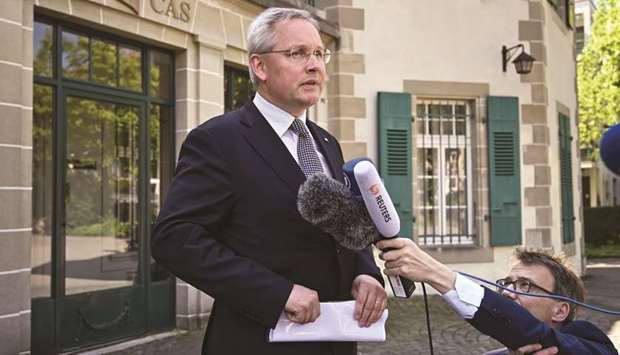The Court of Arbitration for Sport (CAS) ruling on testosterone levels for women in certain athletics events may have settled the case of Caster Semenya and others for now but the CAS itself made it clear that the issue is far from over.
And the debate around intersex and transgender athletes could also affect other sports, with the International Olympic Committee already in the process of looking into updated guidelines for itself and other sports federations on how to handle this sensitive matter.
The IOC said it wants to “shape sport specific policies and regulations in relation to fairness, safety, inclusivity, and non-discrimination on the basis of gender identity and sex characteristics.”
That is a big task, given the difficulties CAS itself noted in an the executive summery. “Natural human biology does not map perfectly onto legal status and gender identity.
The imperfect alignment between nature, law and identity is what gives rise to the conundrum at the heart of this case,” the court said. Semenya was disappointed by the outcome, the two-time Olympic and three-time 800-metre world champion having brought the case to CAS in order to prevent the ruling athletics body IAAF from introducing a new testosterone level cap for herself and others in running events from 400m to the mile.
Believed to be intersex (results of gender tests have never been officially published), Semenya must now lower her natural testosterone level by May 8 through medication if she wants to compete at the IAAF World Championships later this year, or switch to other events such as the 5,000m where she became national champion last weekend.
Semenya said she has been specifically targeted by the IAAF for a decade but insisted, “I will once again rise above” while her South African federation ASA said it was “reeling in shock at the how a body held in high esteem like CAS can endorse discrimination without flinching.
There was also sharp criticism elsewhere.
“Women with intersex variations have the same right to dignity and control over their bodies as other women, and it’s deeply disappointing to see CAS uphold regulations that run afoul of international human rights standards,” said Liesl Gerntholtz, deputy executive director of Human Rights Watch.
“In scrutinising and excluding women competitors based on their natural hormone levels, the IAAF regulations stigmatise, stereotype, and discriminate against all women.” Tennis great Martina Navrotilova termed the ruling “dreadfully unfair” and “wrong in principle” on her website.
“She has done nothing wrong and it is awful that she will now have to take drugs to be able to compete. General rules should not be made from exceptional cases and the question of transgender athletes remains unresolved,” Navratilova said.
And German Balian Buschbaum, who underwent a sex change after being a successful pole vaulter as Yvonne Buschbaum, bluntly told dpa: “I would really like to know what Usain Bolt would say if he was given hormones to shrink his legs. Nothing else is asked of Semenya.”
But marathon world record holder Paula Radcliffe defended the CAS because it ruled “that women’s sport needs rules to protect it.” And German athletics federation chief Juergen Kessing named it “a precedent for the whole of high-performance sports.”
The CAS had acknowledged that the IAAF regulations are “discriminatory” but that “such discrimination is a necessary, reasonable and proportionate means of achieving the IAAF’s aim of preserving the integrity of female athletics in the restricted events.”
Germany’s Sueddeutsche Zeitung said it was obvious that “a clearer distinction between men and women is needed in sport compared to normal life.” But it said that if athletes like Semenya needed to lower their performance then others must live with certain natural disadvantages and no longer get exceptions to use asthma sprays or other substances to boost their performances. Britain’s The Guardian said “CAS tried to provide a clear verdict on Caster Semenya but left a tangled mess” because “its ruling contained enough holes and caveats to mean the dispute will continue.”

Court of Arbitration (CAS) Secretary General Matthieu Reeb speaks to journalists after pronouncing the verdict in South African double Olympic champion Caster Semenya’s appeal against International Association of Athletics Federations (IAAF) testosterone rules on May 1, 2019 in Lausanne.
